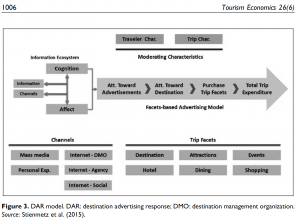
New Publication: de Souza, J., Mendes, LF., Buhalis, D., 2020, Evaluating the effectiveness of tourist promotions to improve the competitiveness of destinations, Tourism Economics, Vol. 26(6), pp, 1001–1020,

Latest research and knowledge exchange news at Bournemouth University



Please see the latest BUCRU Bulletin from the Bournemouth University Clinical Research Unit. We hope you find it interesting. Featuring details on our online NIHR Grant Applications Seminar next week (28th July) and how to register.
BUCRU supports researchers to improve the quality, quantity, and efficiency of research locally by supporting grant applications and providing on-going support in funded projects, as well as developing our own programme of research.
Don’t forget, your local branch of the NIHR RDS (Research Design Service) is based within the BU Clinical Research Unit (BUCRU) staff are working remotely at present so please call us on 01202 961939 or send us an email in the first instance.
We’ve been inundated with words – Ministerial speeches this week, (g)rumblings over social mobility continue, and Parliament showed no signs of slowing down as they hurtled towards recess. Plus lots to look forward to as we look to the next horizon. With that in mind, for BU readers we have issued a horizon scan in our separate occasional series. And for staff outside BU, we have published the summary on the Lighthouse Policy Group blog site.
The Chancellor launched the comprehensive spending review which will conclude in the Autumn. Priorities:
Note that the government response to the Augar report and the conclusion to the Review of Post-18 Education and Funding is also due with the outcome of the review in the Autumn as confirmed by the Minister last week. This was (last) promised in the Autumn last year with the comprehensive spending review that never happened because of the election…..(seems so long ago!).
So with Augar in mind, perhaps, Boris took to the Telegraph last weekend to announce the Cabinet Office is considering restructuring HE fees. His piece sits behind a pay wall so we include the coverage from Wonkhe and Research Professional below.
Research Professional have full coverage here and here.
The piece also states the Government intends to support FE the same way Governments have supported HE. Does this ring alarm bells for anyone else? Tuition fees for FE? Even if fees started small (as they did with HE) this would be a major change and many would argue a blow for social mobility (even if they are income contingent). Of course this is jumping the gun and what the Government probably actually meant by that statement is providing a good level of funding for the FE sector. However, FE fees must have crossed the Government’s mind – apart from anything else, the contrast between apprenticeships (paid for by employers and much grumbled about by government because the levy has not achieved what they wanted) and tuition fees is interesting.
There was lots of commentary following the Telegraph article on Twitter. This one summed it up for Sarah (read the two comments too!) and this one posts excerpts of the article.
Parliamentary questions
The Government announced their scheme to support HE institutions in financial difficulties (detail here). They call it a ‘restructuring regime’ because it is – any institutions needing to access the loan to keep themselves afloat can expect full intervention – chopping courses and curtailing services to only deliver the aspects the Government considers in the public interest (fitting national priorities and any local demonstrated needs). The Government are clear the support isn’t for all providers, so if the Government doesn’t think the institution can deliver in the national interest it will be allowed to close – Government’s intention is not to provide a blanket bail-out to the sector. It is not a guarantee that no organisation will fail (WMS). If that happens the OfS student protection arrangements will come into force – see later in this section for the consultation on those.
Conditions would be determined on a case-by-case basis, but there are some baselines:
The business review will address a number of things, and this is where the direction of travel really becomes clear:
Some other choice snippets:
And this is telling:
The DfE have done a fantastic job of setting out all the Government’s priorities. This is not just about the restructuring regime, as it says very clearly, this is about government’s priorities for HE going forwards.
Research Professional point out that: Access and widening participation get no mention. And on post-graduation employment that doesn’t reach the ‘graduate’ level threshold they ask – what if the benefits of taking a [degree] course are mainly about gaining better opportunities than are available without it?
SoS Gavin Williamson stated: We need our universities to achieve great value for money – delivering the skills and a workforce that will drive our economy and nation to thrive in the years ahead. My priority is student welfare, not vice-chancellor salaries.
These latest rescue measures are not available to independent HE providers who do not already receive public funding. Alex Proudfoot, Chief Executive of Independent Higher Education, said:
It would be a difficult task for the Government to extend a similar ‘restructuring regime’ bailout to the independent sector (not least because the DfE don’t have their heads around these type of providers yet) but Alex makes a key point in highlighting the lack of arrangement for this sector. This Government is keen for the independent providers to be a success (and suitable competition to drive up standards in regular HE), these private providers are also a crucial part of the bridge between industry and education in the Government’s technical and vocation pathways agendas. Yet these providers may go under before the FE reforms are enacted.
RP comment:
OfS: consultation on new powers to intervene
Alongside this the OfS announced a consultation on a new targeted condition of registration allowing the OfS to intervene more quickly where providers are at material risk of closure and therefore there is increased risk to students’ studies. It is intended the new powers continue post pandemic: The implementation of proposals set out today would help ensure the protection of students on an ongoing basis, both during and after the pandemic.
OfS are proposing that providers comply with specific directions to take action to protect students such as:
Nicola Dandridge, Chief Executive OfS, said:
The Government (DfE) has set out proposals to strengthen relationships with colleges and promote better planning within FE provision. The Dame Mary Ney review on the financial oversight of colleges concluded 9 months ago and has now been published by the Government along with their response. It proposes:
More changes are expected to be announced when the Government publish their FE White Paper (due Autumn).
Some key excerpts from the written ministerial statement:
Survey – Despite the Government’s intentions to invest in FE the Association of Colleges’ summer 2020 survey has revealed that colleges are providing hardship support exceeding the costs of what they have available, laptops and connectivity resource doesn’t cover enough of the disadvantaged learners and redundancies are imminent. The report states:
Redundancies:
Hardship
The level of additional resource needed to meet these hardship needs ranged from £20,000 to £2,000,000 with an average of £300,000 per college.
And on transport:
Comments from FE sector on student hardship:
FE Vision – The Independent Commission on the College of the Future has published People, productivity and place: a new vision for colleges – a vision for the college of the future, accompanied by a collection of short essays and case studies about the civic role of colleges.
Here is more coverage on what was said at last week’s Education Committee hearing with Minister Michelle Donelan. We covered this last week but the transcript wasn’t out. You can read it in full here.
We’ve had quite a number of speeches on HE recently – Boris, Gavin, Michelle and Shadow Minister Emma Hardy have all spoken multiple times over the last few weeks. The Minister spoke again this week as part of the Festival of HE (even though it finished over a week ago). Research Professional (RP) cover the speech which reiterated the same themes as her previous speeches and appearance in front of the Education Committee:
The focus away from access only and onto student support, achievement and careers and post-graduation support is all within the current Access and Participation Plans. The big access-only push hasn’t existed since the demise of Aim Higher (and even then Aim Higher did so much more). So the Minister is really only bringing a focus to the aims the work is already pushing for – although likely (to use the words of a former access Tsar) the Government will want further, faster, progress. And this is the sticking point for most HE institutions – fast progress is not easy to come by.
RP state:
RP also have this article on the other aspects of Donelan’s speech in which the Minister called for more modular courses for adult learners lamenting the continued norm for three year degrees.
The Minister feels shorter courses are particularly important for portfolio careers.
Donelan also stated she wanted to see the practice of making conditional unconditional offers “end for good”. “I don’t want to see students making decisions that are not in their best interests. Quite frankly, there is no justification for such practices. Once again Donelan shows herself out of touch with those students for whom unconditional offers were originally designed. But maybe she doesn’t mean them.
The Guardian have a good article taking issue with the Government’s new stance whereby they want less pupils progressing to university and have glossed over the disadvantaged groups access. The article challenges the Government:
Shadow HE Minister Emma Hardy spoke at the Convention for HE (RP cover it here – see second half of article) and today in Conversation with HEPI.
RP report she commented on the Government’s social mobility stance:
On the Government’s rescue HE restructure package RP report that Emma stated:
Emma Hardy’s focussed speech during this week’s Conversation with HEPI was interesting. Labour’s approach to HE agrees with several of the Government’s themes, however, the devil really is in the detail, and there was a world of difference in tone. She is a big fan of FE and HE working together seamlessly to deliver for their local communities. Of course, the Government have been pushing HE to support and work with the full range of local institutions from primary up for years. Labour’s approach is ‘work with to deliver’ not the ‘done to’ sharing of expertise that Theresa May originally envisaged.
Themes:
The OfS have updated their series of reports on unconditional offer making.
As we know, they, and the government, believe that unconditional offers are unconditionally bad, except where they are used to admit students based on a portfolio or similar. That much is very clear after the chaos of the moratorium/proposed retrospective ban/final new licence condition that we have worked through over the last few months. You can read more about the licence condition in our update from 9th July in case you missed it.
Their press release makes it fairly clear;
Their analysis says (excerpts):
The National Student Survey outcomes were published (interactive charts are here). Last week we highlighted the OfS analysis which suggested C-19 didn’t have a real terms impact on the responses given to the survey. This week OfS have published summaries of the data from the national position (the charts can be viewed here).
And as reported last week on the negative side students continued to report comparatively lower rates of satisfaction with how their courses are organised and how effectively changes are communicated by their university or college.
Research Professional report on the NSS. And Wonkhe have a blog examining which factors that improve teaching practice may improve positive outcomes within the NSS. The blog is keen on consistency.
The APPG for students has published Reforming Student Finance: Perspectives from Student Representatives.
Student finance and cost of living
Effects
Information, advice and guidance
Differences between funding agencies across the UK
Other issues identified
Loans – Quick repayment facility
Meanwhile Martin Lewis has attacked the Student Loans Company new website. He isn’t a fan and has called the new repayment tool irresponsible and dangerous, stating it gives UK graduates a damaging and demoralising picture of their debts by exaggerating their outstanding loans. He is campaigning against the quick repayment facility on the website and tries to remind the public that they are only required to repay 9% of their earning above the threshold. He stated that unless huge overpayments were made well above the 9% it makes very little difference to the overall debt, except for the reduction in income that the individual will feel (flushing money away unnecessarily). The BBC report that Lewis intends to write to Michelle Donelan to request the quick repayment facility be removed immediately. Given that it may increase the monies returning to the public coffers and Donelan’s track record of toeing the party line his campaign may fall on deaf ears – or only result in a reminder that they don’t have to make overpayments near the facility on the website.
Research Professional cover the argument, including the SLC’s response to Lewis.
Donelan announced the expansion of the Opportunity Areas programme (additional £18 million) which will twin the 12 Opportunity areas with places facing similar challenges to help unleash the potential among young people in other parts of the country. It is the fourth year of funding for the Opportunity Areas programme and this year will focus on tackling the exacerbation caused by C-19. Catch up schooling, teacher recruitment and training, and early speech and language development are priorities to help narrow the attainment gap within the Opportunity areas. The article details some of the approaches currently in place to help these areas ‘level up’. Approaches include: improving the quality of careers advice, work experience, digital and other skills for employment, holiday clubs, support for excluded pupils, and opportunities to develop confidence, leadership and resilience.
Welsh Universities and Colleges will benefit from the announcement of a £50m support package to help them cope with the impact of the coronavirus crisis (£27m for HE; £23m FE). The support is part of the Welsh Government’s actions to support students and Wales’ major education institutions and provide the skills and learning in response to the economic impact of the coronavirus.
The HE Recovery Fund will support universities to maintain jobs in teaching, research and student services, invest in projects to support the wider economic recovery, and support students suffering from financial hardship.
The FE funds will increase teaching support following students’ time away from education due to C-19 virus and help new students with their transition to post-16 learning. Up to £5 million will be provided to support vocational learners to return to college to help them achieve their licence-to-practice qualifications, without needing to re-sit the full year.
An extra £3.2 million will be used to provide digital equipment such as laptops for FE students. £100,000 will also be provided to support regional mental health and wellbeing projects and professional development in Local Authority Community Learning.
King’s College London, the University of Chicago and the University of Melbourne have published Advancing University Engagement: University engagement and global league tables stating that universities need to better demonstrate their value to society. Universities around the world are making a positive impact through engagement but, unlike teaching and research, this is rarely recognised or celebrated. The report calls for societal impact to be recognised in university rankings and proposes a new framework to measure and rank this impact, or ‘engagement’ to be incorporated into global university league tables. The authors suggest this would encourage universities to ensure more of their activities benefit local communities and wider society, while better showcasing the existing benefits they produce.
Richard Brabner, Director UPP Foundation (which established the Civic University Commission), said:
BEIS published the 2019 edition of Public attitudes to science which looks at the UK public’s attitudes to science, scientists and science policy. The survey shows that public opinion places scientists and engineers as the trustworthy professionals, that the public is supportive of spending on ‘blue skies’ research, and that UK adults are becoming more familiar with, and more adaptable to, an ever-accelerating pace of technological change. It also looks in depth on attitudes towards an ageing society, AI and robotics including their use in healthcare, genome editing within food security, and micro pollution and plastics. It finds the public continues to have an appetite for information about science and mainly use television, online news platforms and Facebook to stay informed. However, they’re unsure if they can trust media reporting of science issues – with online sources particularly mistrusted.
On the ageing society:
On AI and robotics:
EU Budgets – The EU R&D budgets have come back well below the level expected. Research Professional report:
This RP article has more detail and the responses from the European research alliances and guilds.
UUK, GuildHE, the Russell Group and European bodies have signed this joint statement aiming to reach agreement by addressing the sticking points on UK participation in Horizon Europe. It addresses:
The statement argues that, with enough will on both sides, it should be possible to reach an agreement before the Horizon Europe programme is due to begin in January whilst acknowledging that time is rapidly running out.
UKRI – UK Research and Innovation (UKRI) published their (146 page) Annual Report and Accounts (2019-20). The report recognises the stated significant milestones and achievements as the work supporting the research and innovation community during the COVID-19 pandemic, and the delivery of significant
PhD to Academia – a challenging transition – HEPI published PhD students and their careers examining the professional ambitions of PhD students. Key findings:
The report incorporates qualitative research that captures the voices of PhD students:
Post report the media picked up on the above stated difficulties of moving into an academic career for an early career researcher.
Research parliamentary questions covered:
And an oral question:
Q – Daniel Zeichner (Lab) (Cambridge): What steps he is taking to secure the future of UK research and development.
A – Amanda Solloway (The Parliamentary Under-Secretary of State for Business, Energy and Industrial Strategy): The Government are now implementing their ambitious R&D roadmap, published earlier this month, reaffirming our commitment to increasing public R&D spending to £22 billion by 2024-25 and ensuring the UK is the best place for scientists, researchers and entrepreneurs to live and work.
Q – Daniel Zeichner: I appreciate the recent announcements, but can the Minister reassure us that all universities will be able to access those loans, with freedom to invest in line with local priorities? Will she take a look at the proposals from the new Whittle laboratory in Cambridge, which needs to match the already secure £23.5 million in private sector funding to develop the first long-haul zero-carbon passenger aircraft?
A – Amanda Solloway: I give my assurance that one of the things we are addressing in the roadmap is ensuring that we become a science superpower. Within that, we are levelling up across the whole of the country. I am committed to making the workplace diverse and ensuring that we have a culture that embraces that throughout the whole of country. We will ensure that UK scientists are appreciated and rewarded.
Mr Sheerman:…The Minister has a business background, so does she not realise that if she could persuade the Chancellor of the Exchequer to follow Mrs Thatcher’s example and introduce a windfall profit tax on people who have made a lot of money—the gambling industry and companies such as Amazon—that could be ploughed into research and development? Universities will go through a tough time in the coming months and years, so let us put real resources into research and development as never before.
Amanda Solloway:…The hon. Gentleman will be aware that we have a taskforce that has been looking into how to support universities. It has enabled us to set up a stability fund, which will enable R&D to continue in our institutions. In addition, in the roadmap, which contains the place strategy, we are talking about lots of levelling up. We are making sure we have the opportunity to take this forward and become the science superpower that we all want to be.
Advance HE have published Three months to make a difference a booklet detailing seven areas which are challenging for disabled students alongside recommendations for their resolution. It draws on the content raised in a series of roundtables run by the Disabled Students’ Commission (supported by OfS). It highlights that rapid action is needed to ameliorate for the additional challenges C-19 creates for disabled students.
Parliamentary question: Disabled students’ allowances
UUK have published a press release stating that universities from across the UK have agreed new principles to tackle grade inflation, reconfirming the sector’s strong collective commitment to protect the value of qualifications. There are 6 principles and recommendations to be guided by when deciding the final degree classifications awarded to students. The principles will be added to the UKSCQA statement of intent which outlines specific commitments universities have made to ensure transparency, fairness and reliability in the way they award degrees.
The press release explains:
Alongside six new principles which cover the importance of providing clear learning outcomes, regular reviews, student engagement and transparency in algorithm design, the report includes examples of recommended good practice in the following areas:
Research Professional write about the announcement and comment:
The Royal College of Nursing has published Beyond the Bursary: Workforce Supply. It states to get more people into the nursing degree and successfully graduating in England, the Government must provide appropriate support both on entering and throughout the degree. This report details our modelling, undertaken by London Economics, which demonstrates the level of funding required to increase the number of applicants to the nursing degree. It calls on the Government to immediately:
Parliamentary question:2020 nursing applications so far
Click here to view the updated inquiries and consultation tracker. Email us on policy@bournemouth.ac.uk if you’d like to contribute to any of the current consultations.
Parliament is winding down. The House of Commons enters recess at the end of this week, with the Lords following shortly after. Although MPs will return to deal with constituency business and take their summer holidays Ministerial business will continue to tick over with possible, HE announcements during this traditional down period. We’ll continue to monitor the latest developments and keep you informed periodically through the policy update. We anticipate the policy update will be shorter and we won’t send it every week throughout the summer period we have our own recess too, after a very busy few months.
Levelling up: Guardian article on creating the MIT of the North.
Admissions: iNews has an article based on comment from an Ofqual former board member which states that universities should check with schools what teachers originally predicted because a ‘significant minority’ of students are likely to end up with the ‘wrong’ final grades.
Boys ambition: The Guardian has an article based on research by UCL suggesting boys are more ambitious than girls and more likely to reach to apply to higher tariff institutions. They suggest it could be a factor in explaining the gender pay gap. It also suggests that having firm or ambitious university plans means higher GCSE grades too (compared to pupils with looser intentions).
Brace yourself: Diana Beech (ex HEPI, ex-Universities Minister’s policy advisor) writes for Research Professional’s Sunday Reading reflecting on the last year of Parliament’s HE changes and anticipating what is still to come. Here are a couple of excerpts looking forward:
And that’s what we think too Diana!
To subscribe to the weekly policy update simply email policy@bournemouth.ac.uk.
JANE FORSTER | SARAH CARTER
Policy Advisor Policy & Public Affairs Officer
Follow: @PolicyBU on Twitter | policy@bournemouth.ac.uk
Last month colleagues and I in the Department of Social Sciences and Social Work, and members of the Seldom Heard Voices Research Centre, convened a round table discussion on racism, the impact of Covid-19 on minority groups and the rise of #BlackLivesMatter following the murder of George Floyd. As someone who teaches intersectionality to social science students, I presented background information on racism within the criminal justice system as well as on my own research experiences on hate crime. Today’s blog considers the first of these areas, and I hope colleagues will join me in sharing their own stimulating presentations in the coming days.
As students in my classes will be aware, there is a long history of marginalisation, discrimination and prejudice against minority groups in the UK. I only have the space here to briefly consider the particular relationship of Black and Asian minority groups with the criminal justice system but hope it will encourage wider debates. Although this is an area that we have seen awareness raised around in recent weeks, following the murder of George Floyd and the subsequent protests here and overseas, these issues are not new.
The contributory factors surrounding the murder of Mr Floyd are not specific to the USA and given its history of colonialisation has many similar features to the UK also. As we wait to hear the outcome of the charges and trial of the police officers involved in Mr Floyd’s death, we must bear in mind that in the UK there have been no successful prosecutions for deaths in British Police custody since 1969 – that is, over 50 years. That is not to say there have not been deaths in police custody since that time – there have been hundreds – and they have been proportionately more likely to involve the death of a black man than any other ethnic group.
What is the relationship between race and crime? Criminology students start by considering the groundbreaking work of Stuart Hall and colleagues in Policing the Crisis: Mugging the State and Law and Order, originally published in 1978, exposing a socially constructed moral panic around young black ‘muggers’.
Since that prosecution in 1969 of two Leeds officers for the death of David Oluwale, we have seen repeated evidence of prejudice and discrimination by the CJS towards our black communities. There was the Scarman report of 1981, focussed on responding to undercover officers targeting BAME communities in Brixton, which involved hundreds of people being stopped and searched on the basis of ‘suspicion’ and subsequent public disorders (note: I refuse to use the term ‘riot’). In 1995 Sir Paul Condon, then Commission of the Met Police, said young black men were committing 80% of muggings in high crime area, implying that it was colour of skin rather than socio-economic backgrounds and structural conditions that were a factor in criminality, showing little had changed.
We have seen the MacPherson report of 1999 investigating police response to the murder of Stephen Lawrence, which was the genesis of hate crime legislation and victim-focussed policing in the UK. We have witnessed disorders or ‘riots’ from 1985 in Birmingham, Brixton, Broadwater Farm, Meadow Well Estate, and Tottenham again in 2011. As with recent reports, the actions of minority members resulted in heavy handed or excessive police responses, and further undermined the fragile community relations between police and minority communities.
Despite the introduction of the Police and Criminal Evidence Act in 1984, communities continued to complain about increasing numbers of discriminatory targeting of black men through the use of stop search – particularly young black men.
Consistently, Black men were more likely to be stopped and searched than white men.
Consistently, Black people were more likely to be arrested and charged compared to other ethnic groups.
Throughout the criminal justice system, as the Lammy Report (2017) shows us, a BAME man was more likely to be stopped, arrested, charged, denied bail, convicted and sentenced to prison than a white man with the same previous history, and the same offence.
So racism is not new. Outrage is not new. And no wonder our communities are tired of peaceful protests and not being heard. This prejudice exists both within our CJS structurally, and within our communities. It is fuelled by processes of dehumanisation and racialisation. What bothers me most about these recent events is that we are still having to debate and argue about the extent of racism within our societies today, and as this brief overview has shown, lessons have not been learnt.
All of this comes within the embedded dehumanising, stigmatising and Othering of minority communities. From Ben Bowling’s work on racism in the police in 1998, Kathryn Russell’s call in 1992 for a Black criminology to investigate the over-representation of race and ethnicity in crime statistics – as well as victim statistics – to Alpa Parmer in 2017 who highlights there is still too little criminological research on the nexus between race, gender and crime… I add to their calls for action. We all have a responsibility for action.
Jane Healy
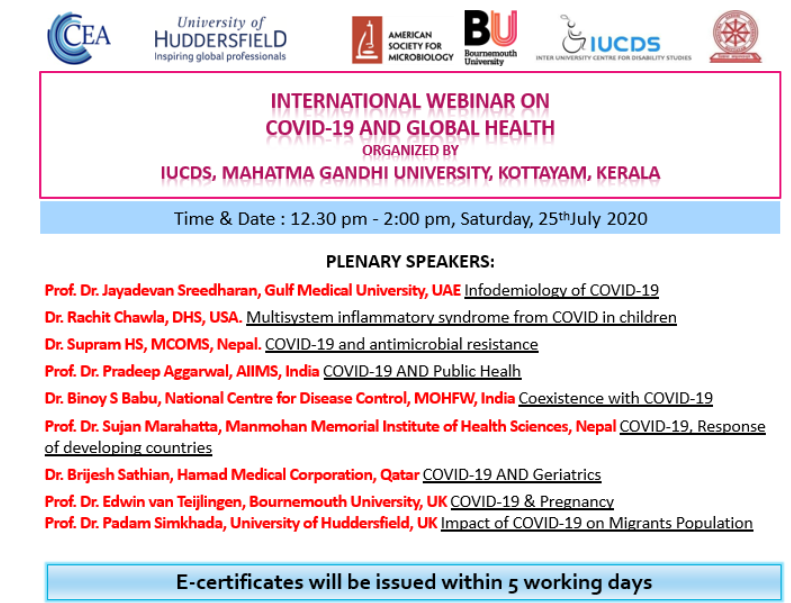 International Webinar on COVID-19 and GLOBAL Health coming Saturday 25 July. This webinar, organized by Mahatma Gandhi University, India, includes speakers from the Middle East, America, Europe and South Asia. Bournemouth University will be represented by Professor Edwin van Teijlingen from the Centre for Midwifery, Maternal & Perintal Health (CMMPH). Please note the advertised times are local Indian time, the event will take place coming Saturday at 8.00 AM UK summer time.
International Webinar on COVID-19 and GLOBAL Health coming Saturday 25 July. This webinar, organized by Mahatma Gandhi University, India, includes speakers from the Middle East, America, Europe and South Asia. Bournemouth University will be represented by Professor Edwin van Teijlingen from the Centre for Midwifery, Maternal & Perintal Health (CMMPH). Please note the advertised times are local Indian time, the event will take place coming Saturday at 8.00 AM UK summer time.



Dear colleagues
– Do you have a great idea for research in health, social care or public health?
– Are you planning to submit a grant application to NIHR?
Our popular seminar (which was previously planned in Bournemouth on 24 March and cancelled due to lockdown) has now moved online and will take place on Tuesday 28th July 2020 from 2.00pm – 4.30pm.
The seminar provides an overview of NIHR funding opportunities and research programme remits, requirements and application processes. We will give you top tips for your application and answer specific questions with experienced RDS South West advisers.
We will also be joined by Simon Goodwin – RfPB Programme Manager for the South West and East of England. Find out more and book a place.
Your local branch of the NIHR RDS (Research Design Service) is based within the BU Clinical Research Unit (BUCRU)
We can help with your application. We advise on all aspects of developing an application and can review application drafts as well as put them to a mock funding panel (run by RDS South West) known as Project Review Committee, which is a fantastic opportunity for researchers to obtain a critical review of a proposed grant application before this is sent to a funding body.
Come as early as possible to benefit fully from the advice
Feel free to call us on 01202 961939 or send us an email.
Dr. Alina Dolea launched officially the institutional collaboration between the International Communication Association’s (ICA) Public Diplomacy Interest Group and International Studies Association’s (ISA) International Communication Section (ICOMM) during the ICA virtual conference in May 2020: in the inaugural ICA & ISA roundtable, public diplomacy scholars across the world had a chance to discuss not only the linkages between different theories and institutions, but also to reflect on innovative practices to continue academic conversations with the reality of COVID-19 influencing nearly every aspect of our lives.
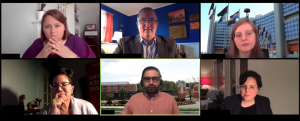 A video recording of the roundtable on Public Diplomacy and “what is next after COVID-19” is now available here. Co-chaired by Alina and Efe Sevin of Towson University, Maryland, USA (ISA ICOMM Section Chair 2019-2020), the roundtable gathered Caitlin Byrne (Griffith University, Australia), Constance Duncombe (Monash University, Australia), Natalia Grincheva (Higher School of Economics, Moscow, Russia) and Steve Pike (Syracuse University, USA). Among the topics discussed were soft power in Australia and Asia Pacific region, ZOOM diplomacy, social media and a need for ‘slower thinking’ in PD, museum soft power mapping, competing discourses in PD, or US PD; a detailed summary of interventions can be read here.
A video recording of the roundtable on Public Diplomacy and “what is next after COVID-19” is now available here. Co-chaired by Alina and Efe Sevin of Towson University, Maryland, USA (ISA ICOMM Section Chair 2019-2020), the roundtable gathered Caitlin Byrne (Griffith University, Australia), Constance Duncombe (Monash University, Australia), Natalia Grincheva (Higher School of Economics, Moscow, Russia) and Steve Pike (Syracuse University, USA). Among the topics discussed were soft power in Australia and Asia Pacific region, ZOOM diplomacy, social media and a need for ‘slower thinking’ in PD, museum soft power mapping, competing discourses in PD, or US PD; a detailed summary of interventions can be read here.
Serving as elected chair of the ICA PD IG, Alina has worked closely with the leadership teams of both organizations, since 2019, and discussed how the gap in between the disciplines of Communications and International Relations can be bridged to advance the field of public diplomacy. The idea of joint panels at the main ICA and ISA annual conferences was agreed, but the pandemics led to the last minute cancelling of the ISA2020 convention; therefore, the launch of the institutional collaboration happened virtually, during this roundtable. Future plans include the organization of similar virtual sessions and events throughout 2020 and 2021, open to doctoral, early career researchers, mid-career and senior scholars from all over the world, as well as joint editorial projects and publications, such as this.
Alina is a founding member of the ICA Interest Group established officially in 2016, following a collective effort of raising sign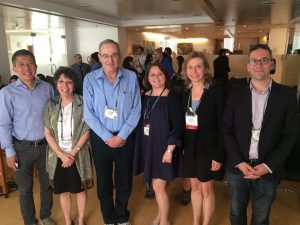 atures that she co-ordinated as a volunteer. The Group has grown fast to over 100 members worldwide and brings together scholars investigating topics related to public diplomacy, nation branding, country image and reputation, public relations for and of nations, as well as political, global and cultural communication influencing international relations. She organized the 2018 doctoral and postdoctoral Public Diplomacy preconference in Prague and the 2019 Washington “Public Diplomacy in the 2020s”, including a panel hosted by the US Department of State.
atures that she co-ordinated as a volunteer. The Group has grown fast to over 100 members worldwide and brings together scholars investigating topics related to public diplomacy, nation branding, country image and reputation, public relations for and of nations, as well as political, global and cultural communication influencing international relations. She organized the 2018 doctoral and postdoctoral Public Diplomacy preconference in Prague and the 2019 Washington “Public Diplomacy in the 2020s”, including a panel hosted by the US Department of State.
ICA is the premier international academic association for scholars in communication research, gathering more than 4,500 members from 80 countries; ISA is one of the oldest interdisciplinary associations dedicated to understanding international, transnational and global affairs, founded in 1959, with more than 7,000 members (academics, practitioners, policy experts, private sector workers and independent researchers).
The top-tier open-access journal, Media and Communication, has released a timely bumper thematic issue on heath and science controversies in the digital world, edited by Associate Professor An Nguyen of BU and Dr Daniel Catalan of University Carlos III of Madrid.
In addition to nine full research articles covering a range of health and science controversies (e.g. anti-vaccine movements, climate change denial, Flat Earth doctrine, anti-5G vandalism, nanotechnology, green energy), the issue features ten rapid-response commentaries on the Covid-19 infodemic from Africa, China, Japan, Vietnam, Italy, Spain, Germany and the US.
“Digital media, especially online social networks, open a vast array of avenues for lay people to engage with news, information and debates about important science and health issues,” said Dr Nguyen.
“But, as the Covid-19 infodemic shows, they have also become a fertile land for various stakeholders to spread misinformation and disinformation, stimulate uncivil discussions and engender ill-informed, dangerous public health and science decisions.”
New BU co-authored article ‘Building Strong Primary Health Care to Tackle the Growing Burden of Non-Communicable Diseases in Nepal’ will be published soon [1]. This paper has been accepted by the international journal Global Health Action (published by Taylor & Francis). The international authorship comprises Nepal, Denmark and the UK.
Nepal is currently facing a double burden of non-communicable diseases (NCDs) and communicable diseases, with rising trends in the former. This situation will add great pressure to already fragile health systems and pose a major challenge to the country’s development unless urgent action is taken. The paper argues that while the primary health care approach offers a common platform to effectively address NCDs through preventive and curative interventions, its potential is not fully tapped in Nepal. In line with the Alma-Ata and Astana declarations, the authors propose an integrated approach for Nepal, and other low-and middle-income countries, including six key reforms to enhance the primary care response to the increasing burden of NCDs. These six key areas are: (1) Life-course approach to addressing NCDs; (2) Task shifting for NCD risk factor management; (3) Strengthening informal care givers; (4) Strengthening quality of PHC and health systems; (5) Establish strategic information management system; and (6) Healthcare financing.

Prof. Edwin van Teijlingen
CMMPH
Reference:
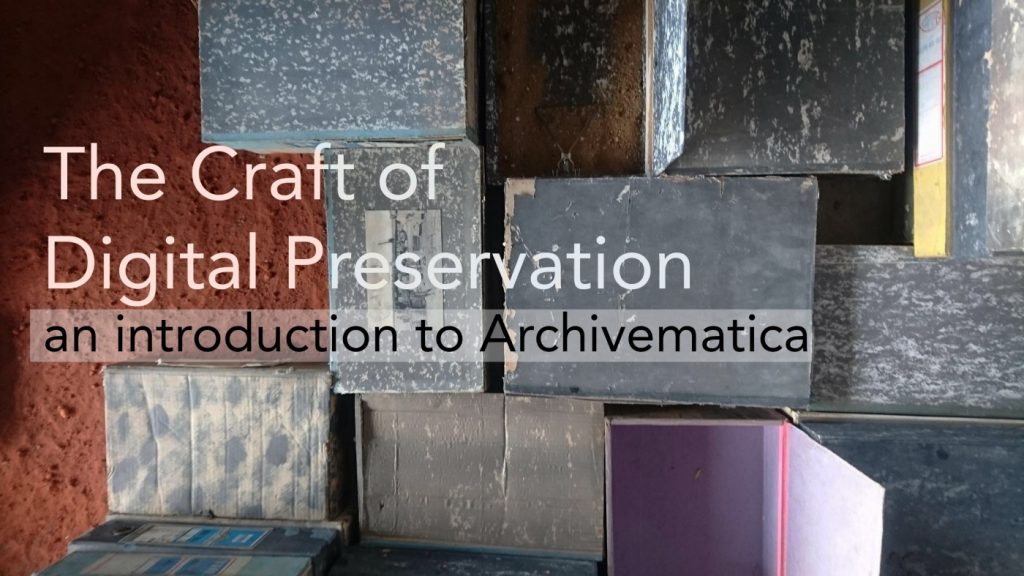
This workshop will introduce some of the ideas and practices involved in digital preservation, drawing on the experience of an ongoing AHRC project led by Associate Professor Paula Callus (‘ArtoP: The Visual Articulations of Politics in Nigeria’). This research project has been concerned, in part, with capturing and archiving ephemeral visual expressions of political ideas, which are often ‘born digital’ and circulate online.
Digital preservation is a growing area of concern for researchers working with digital and online content, and is increasingly an area of interest for research funding bodies like the AHRC. After briefly introducing some of the major challenges and approaches to digital preservation, Dr. Malcolm Corrigall will demonstrate the use of the web-based digital preservation system, Archivematica. This session is aimed at anyone with an interest in digital preservation, or with a specific interest in using the Archivematica application for digital preservation work.
This session will be followed by a subsequent workshop (date TBC) demonstrating the use of Access to Memory (AtoM), an application for creating publicly accessible web-based archives that works well alongside Archivematica.
For more information and to sign up please contact:
mcorrigall@bournemouth.ac.uk
pcallus@bournemouth.ac.uk
Dr Huseyin Dogan (Principle Investigator) and Co-Investigators (Dr Paul Whittington, Professor Keith Phalp, Dr Nan Jiang and Dr Benjamin Gorman) from the Faculty of Science & Technology have recently been awarded £31,612 funding from the Department of Culture, Media and Sport, in collaboration with Innovate UK and the Knowledge Transfer Network, through the Cyber Academic Startup Accelerator Programme (CyberASAP). This external funding supports BU2025 Assistive Technology Strategic Investment Area.
Our CyberASAP project is named Authentibility Pass and the concept is for a smartphone application that will assist people who have reduced physical and cognitive abilities to communicate their authentication and accessibility requirements to organisations, including banks, SMEs and charities. This will be achieved by implementing secure organisation databases that store customers’ requirements. We believe the benefit of Authentibility Pass will be to increase the awareness of employees of the suitable methods to support customers with reduced abilities, resulting in higher customer satisfaction. The solution will be customisable to suit specific organisations through a ‘Software as a Service’ with varying licensing options, e.g. monthly or annual subscriptions. We have conducted market analysis and identified that there is a need for Authentibility Pass, as organisations who do not comply with accessibility regulations lose approximately £80,000 per annum through accessibility claims. Authentibility Pass builds on the knowledge obtained during Dr Paul Whittington’s PhD and Postdoctoral Research and the development of the SmartAbility Framework (supervised by Dr Huseyin Dogan and Professor Keith Phalp).
The CyberASAP programme is designed to assist academics in UK Universities to commercialise Cyber Security ideas, by providing expertise knowledge and support. Lesley Hutchins (Research Commercialisation Manager, RDS) is also included in our team to provide advice regarding commercialisation and intellectual property. There are two phases of the programme and we are currently midway through the first phase, which is the Value Proposition and Market Validation.
Usually the CyberASAP events are held in London, but due to COVID-19 these were converted to online webinars using Zoom, organised by the Knowledge Transfer Network. The webinars have been successful and included interactive participation, using ‘virtual breakout rooms’. Our team has participated in the Value Proposition and Market Validation Bootcamps, where we have learnt skills to apply in the first phase of the funding. We have presented at the mid programme review and the Value Proposition assessment, where our team was successful in proceeding to the Market Validation phase.
We are currently having discussions with industries to validate our Authentibility Pass concept, in terms of establishing their need for the Application. The team is having video calls with All-Party Parliamentary Group for Assistive Technology, BU Additional Learning Support, Cumberland Lodge, Diversity and Ability and Google. In addition to these discussions, we are distributing the Authentibility Pass Survey to people with reduced abilities, to understand their current challenges of communicating their authentication and accessibility requirements to organisations. The combination of these methods will validate our Value Proposition for Authentibility Pass, which will be presented to the CyberASAP panel at the end of July.
The remaining 20 teams in the programme will then be judged by a panel of cyber security experts and the successful teams will be invited to submit a proposal to Phase 2 of the programme, Proof of Concept. If our team are successful for this phase, we will receive an additional £60,000 of funding to develop Authentibility Pass. This will run from September 2020 to February 2021 and will cover the staff costs of the existing Co-Investigators, as well as an Application Developer.
Our aim is to convert Authentibility Pass into a commercial product that is used by banks, SMEs and charities to improve their relationship with customers who have reduced abilities. This could result in a spinout company from BU to facilitate the dissemination of the application. We envisage this creating impact for our assistive technology research and we will provide updates on our progress.

This week it is Refugee Week and here in the Faculty of Media and Communication this is significant as we have just started our new British Academy project ‘Understanding LGBTQ Refugees’ and Asylum Seekers’ Support Needs through Listening to Autobiographical Storytelling’. Although I have recently written about Queer Youth Refugees in Documentary Media and Ieuan and I have a forthcoming article on The Undocuqueer Movement in the journal Interactions: Studies in Communication & Culture this project offers a great opportunity to asses support needs and influence policy, with an aim to develop links between diverse help providers across the UK.
The project has a duration of 15 months with a symposium taking place in a year’s time, yet already through early conversations with NGO help service participants we are beginning to learn about the needs of LGBTQ refugees. For example, this morning I was in conversation with Mark Lewis of Hoops and Loops in Cardiff. If you look at this interview on BBC Wales which includes commentary from Jo Stevens MP its clear that there is much to be done.
In the era of Covid-19, when many of us are feeling isolated, psychologically compromised, and wondering whats happening next, its clear that this is equally impacting on asylum seekers and refugees, many of whom have little support, or live in conditions that could hardly be considered as welcoming.
Christopher Pullen (Department of Media Production) and Ieuan Franklin (Department of Humanities and Law).
Updated message (8 July 2020): due to floods in Assam this week this international conference has been postponed by a few weeks.
If you are interested in a more global perspective of COVID-19 you may want to attend the upcoming Online International Conference “COVID-19: A Global Perspective” to be held from 29 to 31 July, 2020 by the PG Department of Economics, Gossaigaon College, Gauhati University, Assam, INDIA. BU will be contributing to the sub-theme COVID-19 and its impact on the health sector.

Professor Edwin van Teijlingen
CMMPH
Events Management graduate Sabine Töppig, who received the VC Fusion Prize in 2019, has just seen a paper based on her dissertation published by the International Journal of Event & Festival Management. The IJEFM, an Elsevier Journal, is one of the two top events management journals (Scopus CiteScore 2018 – 1.73; Scopus CiteScore Tracker 2019 (updated monthly) – 2.14).
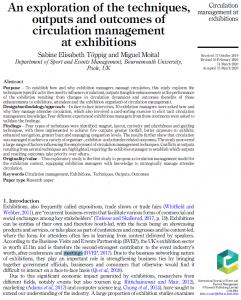
The paper, jointly authored with her supervisor Dr. Miguel Moital, explored the techniques, outputs, and outcomes of circulation management at exhibitions. For those who are unable to access the full published paper, a word version is deposited here.
Commenting on the process leading to the publication of the paper, Sabine said:
“It was great to continue working with with Miguel beyond the submission of my dissertation, to adapt it to journal standards, carry out additional research and examine circulation management at exhibitions in even greater detail. Collaborating with him helped me refine my academic style, broaden my horizons in terms of research methods, and navigate the peer-review process which requires a lot of expertise and flexibility to meet reviewers’ demands. It was also valuable to gain an understanding of the academic publishing system by experiencing it firsthand.”
From a personal perspective, Sabine said:
“It is an amazing feeling to see this paper published. For me, it represents the journey I have been on and how much I’ve learnt about both academia and events during my time at BU. I am pleased to be able to share my excitement for the exhibition industry with others, who can hopefully use this paper to complement their knowledge and learning. Knowing that this paper may be cited in the future or used by practitioners to inform their circulation management decisions feels surreal but incredibly fulfilling.”
Commenting on the achievement, Dr. Miguel Moital said:
“I am immensely proud of Sabine’s achievement. Sabine did a great piece of research for her dissertation and when challenged to work with me on turning the dissertation in to a paper, she did not hesitate. She diligently navigated the steps and challenges that come with submitting and revising a paper. It has been a pleasure working with her. Congratulations, Sabine!”
Dr. Carly Stewart, Head of Department, said:
“The entire team at the department of Sport & Events Management is delighted at the news that Sabine’s paper has been published in such a high standard journal. Concluding her brilliant academic journey at BU by publishing in such high quality journal for our field is a credit to Sabine’s determination and intellectual capability. On behalf of the department, I would like to congratulate Sabine for her achievement.”
Publishing the article follows from two other activities related to the dissemination of her dissertation research:
Presenting a paper at the annual International Conference of Strategic Innovative Marketing and Tourism (ICSIMAT) , in Chios, Greece.
Presenting my dissertation research at an international conference
Delivery of a guest lecture to MSc events Students:
VC Fusion Prize winner delivers guest lecture to MSc Events students
Sabine received the Fusion Prize from BU’s VC Professor John Vinney at the 2019’s graduation ceremony:
Sabine Toppig, BA (Hons) Events Managanent, receives the VC Fusion Prize for her outstanding contribution to research, education & professional practice during her time @bournemouthuni. Very proud of her 4 receiving this prestigious BU wide prize. @BUDepSEM @BUEventsEd #buproud pic.twitter.com/kJIonRnkn1
— Miguel Moital (@MiguelMoital) November 5, 2019
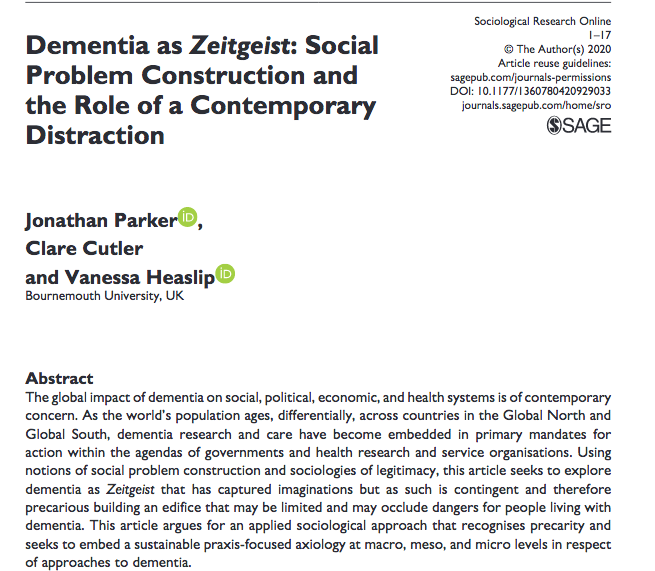 Today the international sociology journal Sociological Research Online (SAGE) published the paper ‘Dementia as Zeitgeist: Social Problem Construction and the Role of a Contemporary Distraction’ [1]. Using notions of social problem construction and sociologies of legitimacy, this article explores dementia as Zeitgeist that has captured imaginations but as such is contingent and therefore precarious building an edifice that may be limited and may occlude dangers for people living with dementia. This paper is written by two BU academics: Prof. Jonathan Parker (Department of Social Sciences & Social Work) and Dr. Vanessa Heaslip (Department of Nursing Science) and former one BU staff member Dr. Clare Cutler . Clare is now at the Wessex Institute for Health Research & Development.
Today the international sociology journal Sociological Research Online (SAGE) published the paper ‘Dementia as Zeitgeist: Social Problem Construction and the Role of a Contemporary Distraction’ [1]. Using notions of social problem construction and sociologies of legitimacy, this article explores dementia as Zeitgeist that has captured imaginations but as such is contingent and therefore precarious building an edifice that may be limited and may occlude dangers for people living with dementia. This paper is written by two BU academics: Prof. Jonathan Parker (Department of Social Sciences & Social Work) and Dr. Vanessa Heaslip (Department of Nursing Science) and former one BU staff member Dr. Clare Cutler . Clare is now at the Wessex Institute for Health Research & Development.

Congratulations
Prof. Edwin van Teijlingen
CMMPH
Congratulations to Dr. Preeti Mahato, Dr. Nirmal Aryal and Dr. Pramod Regmi in the Faculty of Health & Social Sciences on their latest COVID-19 publication. Yesterday the Europasian Journal of Medical Sciences informed us of its acceptance of the article ‘Effects of COVID-19 during lockdown in Nepal’ [1]. The Europasian Journal of Medical Sciences is a peer-reviewed Open-Accessed journal which is published biannually online as well as in print version. It is an official publication of the Nirvana Psychosocial Care Center & Research Institute. 
This is the fifth COVID-19 publication by our team since lock down began (in both the UK and Nepal). Previous publications with colleagues based in the UK and elsewhere across the globe focused on maternity care, public health, Nepal and the apparent effect of COVID-19 on people from ethnic minorities int he UK [2-5].

Prof. Edwin van Teijlingen
CMMPH (Centre for Midwifery, Maternal & Perinatal Health)
References:
 This week Dr. Preeti Mahato in the Centre for Midwifery, Maternal & Perinatal Health (CMMPH) appeared in several newspapers and new website in Nepal. The media reported both in Nepali [1-4] and in English, the latter in South Asia Time [5] on her recently published paper on birthing centres in Nepal. This latest paper from her PhD was published in the scientific journal PLoS ONE [6]. The paper is co-authored by CMMPH’s Dr.Catherene Angell, Prof.Edwin van Teijlingen and Prof. Vanora Hundley as well as BU Visiting Professor Padam Simkhada (Associate Dean International at the School of Human and Health Sciences, University of Huddersfield.
This week Dr. Preeti Mahato in the Centre for Midwifery, Maternal & Perinatal Health (CMMPH) appeared in several newspapers and new website in Nepal. The media reported both in Nepali [1-4] and in English, the latter in South Asia Time [5] on her recently published paper on birthing centres in Nepal. This latest paper from her PhD was published in the scientific journal PLoS ONE [6]. The paper is co-authored by CMMPH’s Dr.Catherene Angell, Prof.Edwin van Teijlingen and Prof. Vanora Hundley as well as BU Visiting Professor Padam Simkhada (Associate Dean International at the School of Human and Health Sciences, University of Huddersfield. 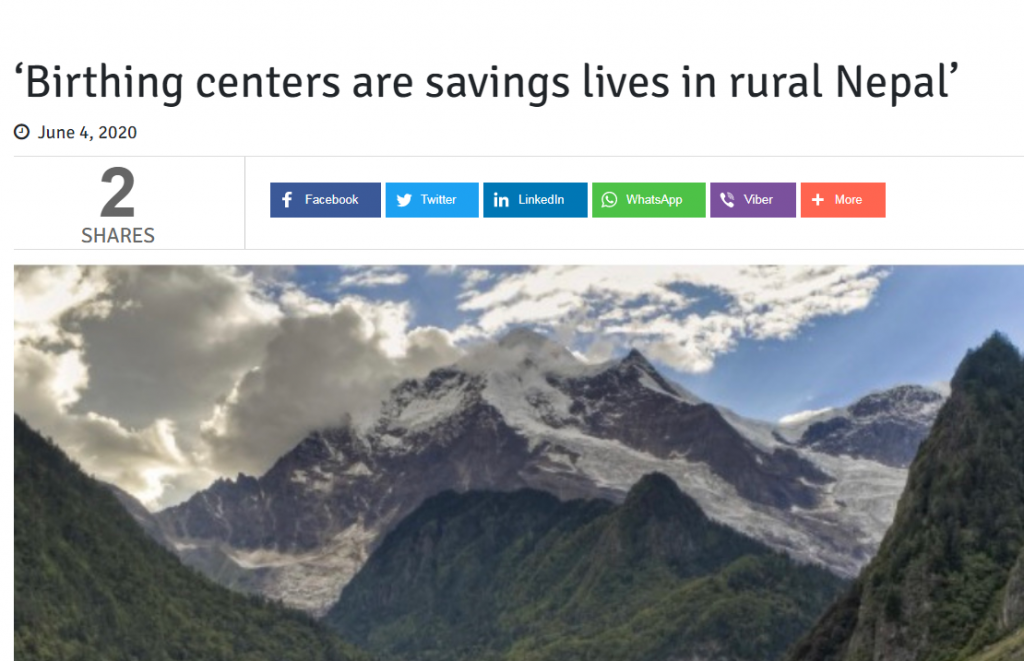
We are very grateful to BU’s Dr. Nirmal Aryal for engaging with all his media contacts in Nepal to achieve this great coverage.
References:
A new article by Prof. Dinusha Mendis (Department of Humanities and Law, FMC), co-authored with Dr. Ana Santos-Rutschman (St Louis University, USA) and Dr. Rosa Ballardini (University of Lapland, Finland) explores the way in which the Covid-19 pandemic has accelerated the use of 3D printing in healthcare. In particular, the article considers the use of 3D printing in the fight against this pandemic and the implications which have arisen in the legal field – as a result of intellectual property laws.
These implications first became apparent in March 2020 in the Lombardy region in Northern Italy, one of the areas which was hit hardest by the Covid-19 pandemic. As the outbreak progressed, a hospital of Chiari (a town in the province of Brescia) came close to running out of valves to connect patients to ventilators. The hospital reached out to the local manufacturers for more, but they could not deliver replacement valves in time – due to their supply chain and restrictions arising from intellectual property laws. However, a local engineering startup heard about the situation and developed three different versions of the valve prototype in a few hours. Within 24 hours, they had used a series of 3D printers to produce 100 valves, by reverse engineering and 3D printing the replacement valves. Furthermore, while a valve from the original manufacturers cost over 10.000 euros, the 3D-printed valves produced by Fracassi and Romaioli were significantly cheaper at around 1 euro.
One of the main reasons for the price disparity between the original valves and the 3D-printed ones, stemmed from the legal framework around technology use. There were also questions raised about the breach of intellectual property laws, by the local engineers.
However, at a time in which there is great legal uncertainty about how 3D printing in general will be regulated worldwide, it is important to think ahead to future scenarios of infectious disease outbreaks, particularly pandemics – where intellectual property laws may appear to stand in the way of critical health issues. In concluding the article, the authors make recommendations for the future and in this context, suggests a carve-out which would become applicable when there is a declaration of emergency by local or national authorities.
>> Read the full article here: https://iprinfo.fi/artikkeli/3d-printing-how-an-emerging-technology-may-help-fight-a-pandemic/
In April 2020, Prof. Mendis, together with partners from UK, Germany, Austria and Finland completed a large scale empirical and legal study on the Intellectual Property Implications of the Development of Industrial 3D Printing. The project was commissioned by the European Commission to Bournemouth University in 2018.
>> Download the full report and executive summary here.